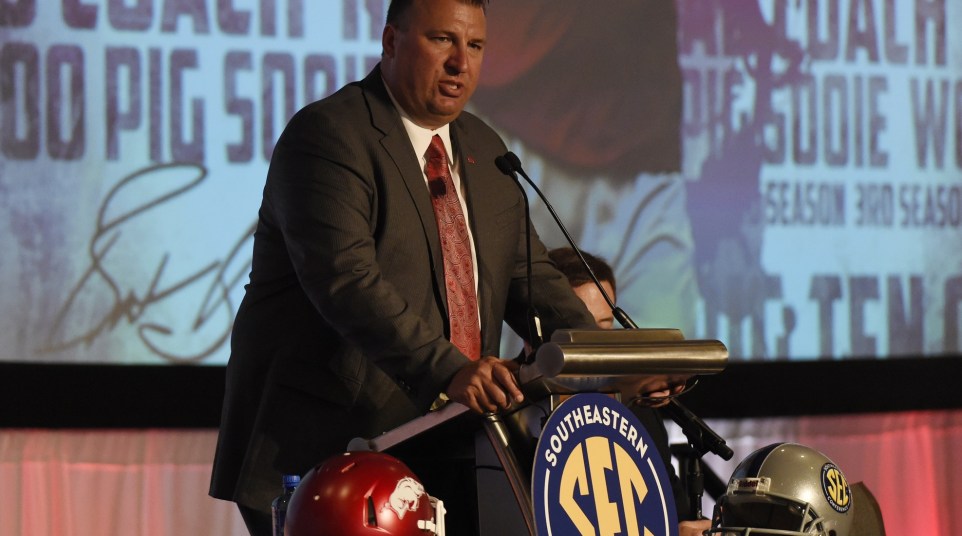Fall camp preview: Arkansas Razorbacks
Our fall camp preview series continues today with the Arkansas Razorbacks, which enjoyed a four-win improvement and a resounding Texas Bowl win in 2014. Expectations have crept higher this offseason as more and more media label this team as a dark horse team in the SEC West. Can the program continue its momentum through the end of 2015 and perhaps even contend for double-digit wins?
PERSONNEL
Arkansas’ running game represented the team’s loudest national narrative in 2014. It helped boost the narrative that Jonathan Williams and Alex Collins both happened to top 1,000 rushing yards, a nice, round number.
But the defense annihilated even strong SEC offensive lines up front, and as coordinator Robb Smith transitioned from zone coverage concepts to more man-on-man later in the season, Arkansas started to shut down — and even shut out — good opponents.
Trey Flowers, the catalyst at defensive end, clobbered offensive tackles with a good bull rush, ideal leverage and polished technique. Behind him, Martrell Spaight took advantage of a clear field to knock down many a ball-carrier. In the middle, Darius Philon slipped between the pads of guards and centers to get pressure on opposing quarterbacks.
The Bermuda Triangle, they came to be called. All three will spend the late summer in NFL training camps as rookie draft picks.
It’s imperative that the 2015 Razorbacks emulate last year’s front seven, even if that means relying on depth rather than on a singular talent like Flowers. Players like Hjalte Froholdt, Jeremiah Ledbetter and Bijhon Jackson are new or relatively new, and fall camp is important for their development.
Brooks Ellis is occupying Spaight’s former spot at weakside linebacker, and the team needs to develop more depth across the second level.
On offense, the team made several position adjustments up front. Dan Skipper has moved from left to right tackle. Denver Kirkland is moving from right guard to left tackle. Frank Ragnow is moving from backup center to right guard. Left guard Sebastian Tretola lost a tremendous amount of weight.
The group already looked settled with their new roles and bodies by the end of spring, but a few more weeks of practice should only solidify that.
PRIMARY POSITION BATTLES
Receiver — Jared Cornelius vs. Dominique Reed: The Razorbacks spent the spring searching for a downfield target to compliment the tight ends and steady No. 1 receiving option Keon Hatcher, and I’m not so sure the team found that player. The team believes Reed, a 6-foot-4 JUCO transfer that did not enroll early, could become an answer this fall. He may compete with Cornelius for targets.
Running back — Jonathan Williams vs. Alex Collins vs. Kody Walker: Arkansas is the only team in the country that returns two 1,000-yard backs. As such, both will play early and often. They depend on each other to keep as fresh and efficient as possible all season. But, as we’ve written about this offseason, there are signs the team could go with an almost-imperceptible shift in the workload in favor of Williams. This fall should give us some clarity. And Walker had an outstanding spring game after converting from fullback. Can he show enough this fall to demand some occasional carries?
Defensive end — Deatrich Wise Jr. vs. Tevin Beanum vs. Jeremiah Ledbetter: JaMichael Winston is the only one of eight rotational defensive linemen locked into a starting position. Wise Jr. could be the team’s best pass rusher. He’s got the most upside of the other seven players and started spring practice opposite Winston on the first defense. Bielema knocked him back, citing too many non-football, non-education distractions (track and field as well as a fraternity). All three of these players will see snaps, but in what order? Arkansas may be best if Wise claims this spot.
END GOAL
Skeptics were easy to find during coach Bret Bielema’s initial 3-9 season in Fayetteville, Ark. The coach has remained stubborn about utilizing his classic power style, but flexible in hiring two new coordinators.
The first, Smith, needs to ensure a seamless transition in the front seven despite some big-name losses. The second, Dan Enos, who arrived this offseason from Central Michigan, is tasked with maintaining the team’s run-first ethos while alleviating some of its predictability with some occasional shots downfield.
The latter task will determine whether Arkansas has enough offensive juice to win close games in the fourth quarter, not just the ones that the Razorbacks bully to a conclusion far before the final 15 minutes of game time.

